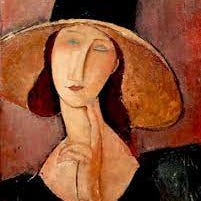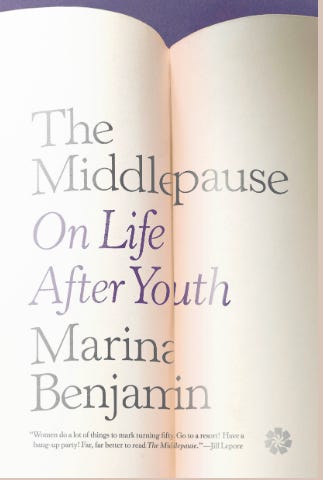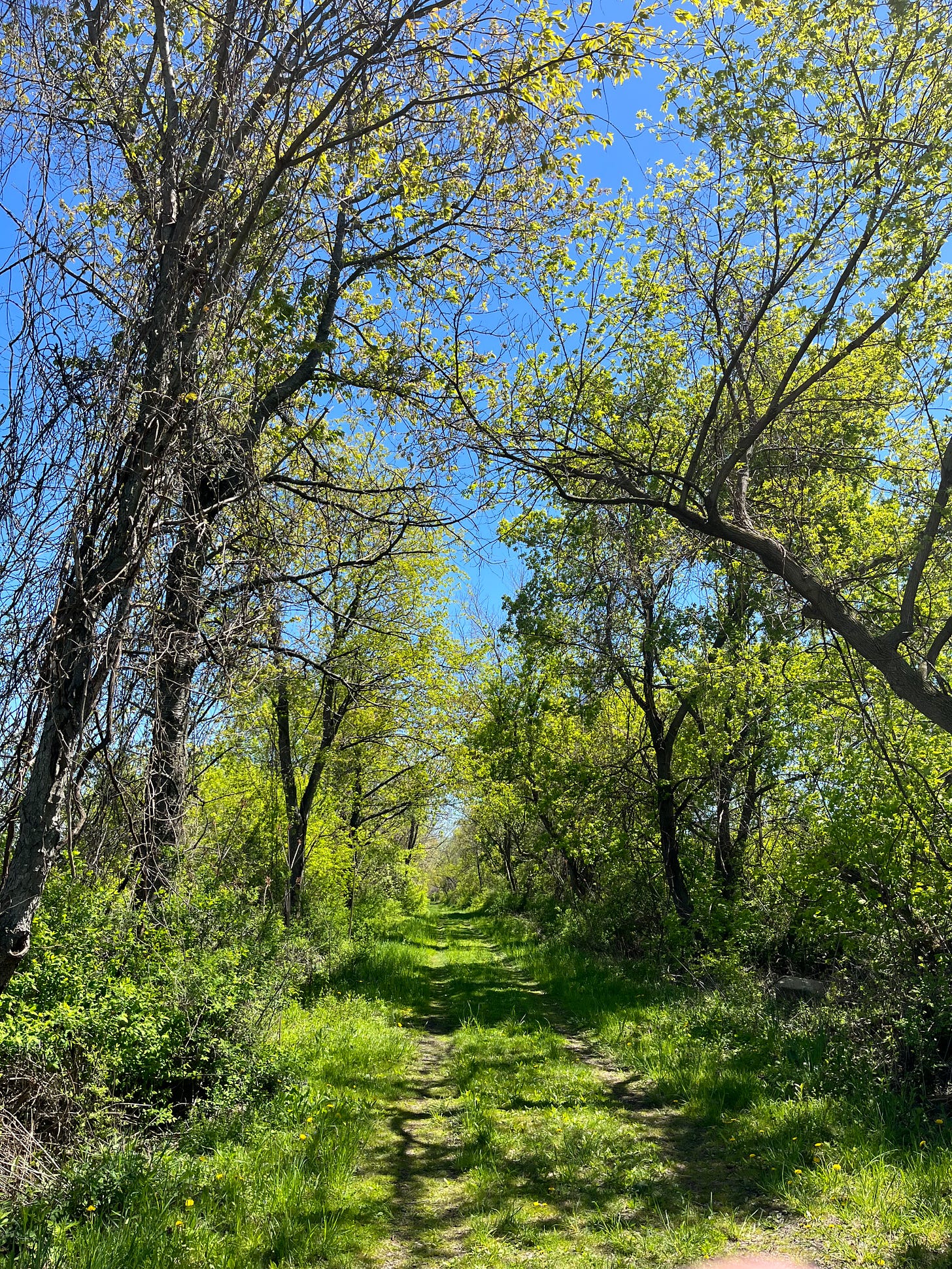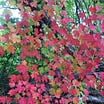Before we begin
How would you define middle age? Are you there yet? Have you already passed through it? How do you know? And, most of all, does it matter?
Welcome! You’ve reached Spark. Learn more here or just read on. If you received this from a friend, please join us by subscribing. It’s free! All you have to do is press the button below. If you have already subscribed, welcome back! BTW, if this email looks truncated in your inbox, just click through now so you can read it all in one go.
Meet Lisa Renee
This week’s post comes to you from Lisa Renee, a Spark subscriber. I’m really happy she wanted to write it for you and equally happy that she has invited me to write, next week, over on her newsletter, The Long Middle.
I don’t remember how or when I discovered Lisa Renee and The Long Middle, but I do remember immediately feeling that I’d crossed paths with someone I’d really like to know better. She was thinking and writing — really really well — about life in the land of middle age. We began to read each others’ work here on Substack and then talked to each other through the comments and Notes. Not long ago, we sat face-to-face on Zoom and talked in real time about this subject, trying to define what the term middle-aged meant anyway. Specifically, when did it start, how long did it last, when was it over, and what was next? What you see here today is Lisa’s take on all that with a focus on when this stage actually begins. Next week, I’ll be tackling it from the other side: nearing the end of middle age (assuming there is one).
A poet and essayist, Lisa jokes in her bio that she still trying to figure out how be a person. She is already a writer of wit, insight, humor, and grace. You will find her at Medium. She has also been published in Exposition Review, The Hairpin, The Billfold, Linden Avenue, Eastern Iowa Review, Lit Pub, and HuffPo. She lives near “a big lake in New York,” has a degree in Art History, and has raised four children who are now, mostly, out of the nest. Here’s a link to The Long Middle followed by Lisa’s essay, “What is the Middle? And when does it start?”
Enjoy! I’ll meet you in the comments section!
What is the middle? And when does it start?
We tell ourselves stories about our lives, an attempt to understand and control them. We box and label the narratives, hoping to keep them tidy and contained. The Middle becomes a thing, a label on a box, as if midlife is a new room we enter. My newsletter is called The Long Middle, because I needed a place to gather the threads of this amorphous chapter. The middle of life is, indeed, long (if we’re lucky) and amorphous, resisting all attempts at boundaries and boxing.
At 59, I’m still in the middle (according to me). I was 44 when I came crashing into this room, like Kramer with the door. This is the story I tell, as that was the year I unraveled. Google says middle age begins around 40-45, so it checks out (with Google, anyway). I’ve also pegged the beginning of my midlife to perimenopause, which is what my unraveling was eventually named (the naming is important in the quest for a boxed narrative). I was there, and now I’m here. It’s a different room, this one. I was, suddenly, a denizen of the middle.
This is too simple, of course, and it’s not the whole truth. Absolutes never are, especially when we’re talking about the amorphous fluidity of life. What is the whole truth? Can we ever know?
When I comb back through memory, I see the fraying begin in my 30s. I remember the exhaustion and the increasingly desperate attempts to keep up and resist change. Things were changing, like it or not, and I was looking the wrong way. Looking out at the big life, with all the kids and the marriage and the animals and the bills and and and … If only I was as attendant to my own shit as I was to everyone else’s, maybe it would have been easier.
The middle, I know now, is not just about menopause. My narrative leans heavily on the change as a feature of my midlife, but now that things are cooling in that department, I realize that meno was just a noisy chapter. A thing that happened in the middle. Other things that happened: Flown kids (or not). Dying parents (Steven’s) and needy parents (mine). Retirement and a surprising new financial stability. Lots of change, good and bad.
The middle implies a beginning and an end. But everything before 44 could not have been the beginning, surely. And I fervently hope that what comes next is not the end. Life cannot, perhaps, be divided in narrative thirds — beginning, middle, end. And if we’re insisting on a “middle,” then I call it a big, fat, long chapter, starting whenever you feel it. It’s arbitrary, right?
Our experiences are unique, and passages want a pivot point. A very good friend of mine died in her fifties — her pivot was death and her thirties marked the rough middle. She could never have known.
For instance, someone with no kids and a fulfilling job may cruise through their forties feeling nothing but the fullness of their life. Without the aging out of kids, or retirement, or an unexpected full body crisis to mark a passage, it may not feel like a new chapter. Our experiences are unique, and passages want a pivot point. A very good friend of mine died in her fifties — her pivot was death and her thirties marked the rough middle. She could never have known.
The middle is not a number but rather a state of mind. A way of situating oneself in the world, a reevaluation of relationships with both others and ourselves. A rethinking of identity, a recalibration. The scraping away of the layers left by young adulthood in a culture that lies to us and tries to make us in its image. I no longer care to preen and don’t feel bad about my neck.
The body has a lot to say in the middle. Aging can feel like a slow moving crisis, but you don’t notice when you feel fine; only when you don’t. My knees, my eyes, my gut — reliably reliable, until they weren’t. You don’t know until you know. But when you know, you’re already in the new room.
Too much is a problem in the middle. Too much coffee, wine, onion, garlic, tomato. Too much exercise, sunshine, sex, sound. Too much of the best stuff hurts sometimes. It’s also, conversely — confusingly — the land of not enough. Not enough sleep, silence, time, sex (mood dependent and moods are dependably fickle for me in this new room).
I am a full time job now.
The middle is anything and everything. Cocktails and tattoos, sobriety and babies, new work and surprising friendships. Lonely or loud. Sexual awakening or a blessed rest, whatever blows your skirt up. It will be birth and death, trauma and recovery, ups and downs. There is comfort in the middle (it’s not yet the end). There’s new introspection and the inevitable question — what have I done with my life? And always, the increasingly loud drumbeat of mortality.
Questions are central to the middle:
Who am I?
What have I done?
How much is left?
Marina Benjamin wrote, in her smart and beautiful book, The Middlepause: On Life After Youth:
“Since it isn’t possible to see the whole of a life, only the part that’s been lived, we rely on other people’s example to conjure its full potential. We also lean on hypotheses and trick questions. We imagine, for instance, what it might be like to be a decade older, or two decades older, and we strain to visualize what our lives might be like then. More often, we review the lived life, thinking that if we could somehow discern a pattern in its vicissitudes then we might better predict what will follow. Or else we try to identify the high point, convinced that from its lofty stand we will have had the best view of the rest.
Hence the confounding question: If you could stop the clock anywhere, where would it be? Name your pinnacle.”
The middle (assuming it isn’t your end) is a pinnacle of sorts. A place not to stop the clock, but to pause and look forward and back, survey the past and imagine a future beyond the fog. The middle is aging and movement, as we watch the calendar pages fly. It’s arbitrary. If you’re not busy being born, or dying, then you’re busy living. That’s the middle. We live and, if we’re lucky, it’s long. Only you can tell the story. Maybe let it out of the box.
Cheers!
Lisa
Here’s where to find out more about the book
For more information about Marina Benjamin’s book mentioned in Lisa’s essay, just click here or on the photo below.
Spark is Yours: Chime In
Hi there, this is Betsy again. Have you just finished a book you loved? Tell us about it. Got a great resource for readers or writers? Share away! How about sharing your book stack with us, that tower of tomes rising next to your bed or your bath or wherever you keep the books you intend to read – someday. And if you stumbled on a Moment of Zen, show us what moved you, made you laugh, or just created a sliver of light in an otherwise murky world.
Thank you and Welcome
Thank you to everyone who has shared Spark with a friend. Please keep it going! We are growing every week and it’s exciting.
Welcome to all new subscribers! Thank you so much for being here. If you would like to check out past issues, here’s a quick link to the archives. Be sure to check out our Resources for Readers and Writers too.
ICYMI: An invitation to authors and writing professionals in our community
We are lucky to have many published authors and writing professionals among us. Why not make a place where readers can find new books and writers can find help right here in the Spark community?
I’m excited to announce that we will be making a space here at Spark for the authors among us to introduce themselves and their books so the many readers among us can browse there for their next read. We will also make a space for the professionals among us who help writers with the craft and the business of writing – editors, writing consultants, readers, etc. – so those who need their help can find them more easily.
The good news is that even though we are assembling these resources from within and for the Spark community, readers who are not subscribers will be able to see it as well and you will be able to share it with anyone you wish.
The rules are simple:
Those listed must be Spark subscribers which is easy and free and brings lots of side benefits such as fun weekly discussions and essays about life and the books that help us get through it. If you later unsubscribe, no problem but your listing may be removed as we update.
If you are an author, you must have published at least one book - it can be old, new, e-book, audio, or print
The book(s) are still available through used/new bookstores, online, or in libraries
To add yourself to either of the lists, click the links below and fill out the simple forms. When we have at least ten folks listed, we’ll make the pages and keep updating them as new folks come in.
We already have some great writers and editors on our lists. I’m excited about this and look forward to seeing folks make new connections. I’m sure there will be glitches from time to time so I ask for your patience as we climb up the learning curve together. Please don’t hesitate to suggest improvements or to point out what’s not working. Thank you!
That’s it for this week. Let me know how you are and what you’re thinking about. And of course, always let me know what you’re reading. If there’s an idea, book, or question you’d like to see in an upcoming issue of Spark, let us know!
Remember, If you like what you see or it resonates with you, please share Spark with a friend and take a minute to click the heart ❤️ below - it helps more folks to find us!
Ciao for now!
Gratefully,
Betsy
P.S. And now, your moment of Zen…the metaphor of the path
I have become a little obsessed with paths, which could be a metaphor for so much (especially here in the middle). Looking back through my photos, there are dozens of path pictures, in various places, through all seasons. There’s an essay in there, somewhere. Here’s a May path from an abandoned railroad bed near my house for your Zen moment. It makes me pause every time. - Lisa
Calling for Your Contribution to A Moment of Zen
What is YOUR moment of Zen? Send me your photos, a video, a drawing, a song, a poem, or anything with a visual that moved you, thrilled you, calmed you. Or just cracked you up. This feature is wide open for your own personal interpretation.
Come on, go through your photos, your memories or just keep your eyes and ears to the ground and then share. Send your photos/links, etc. to me by replying to this email or simply by sending to: elizabethmarro@substack.com. The main guidelines are probably already obvious: don’t hurt anyone -- don’t send anything that violates the privacy of someone you love or even someone you hate, don’t send anything divisive, or aimed at disparaging others. Our Zen moments are to help us connect, to bond, to learn, to wonder, to share -- to escape the world for a little bit and return refreshed.
And remember,If you like what you see or it resonates with you, please share Spark with a friend and take a minute to click the heart ❤️ below - it helps more folks to find us!










When the middle happens, depends on the trajectory of your early life. I didn't marry until age 36, and I wandered through most of my 20s. So I was just embarking on child-raising in my late 30s and early 40s. Traditionally, at least, when I was young, 40 was the beginning of the middle years or the midlife. That is probably still true, but it extends now all the way to age 60 I would say. People don't like to call themselves old until after 65. Often not even then. My mid life was indeed a blur, full of activities with my children, my job, and caring for an aging parent. We had a grand birthday party for my 50th, but I don't recall anything about my 60th birthday. A little joke: my husband announced to the assembled group at my birthday party that I had just passed a huge milestone. The room roared.
Now I am 70. And definitely in the last third or less of my life. There is much that is unpredictable about this period of our lives. We don't know what will happen with our health and so that leads to unpredictable financial situation's, job situations, etc. If I had any words of advice to give young people, it would be these two: 1st, take time to do the things you enjoy. If you want to go on trips, do it now, while you have your health. Second, save money. Put it into your budget. These are the prime years for saving for retirement and if you don't do it now it won't happen later. Third, don't focus on your career. It is of ephemeral value, and family and experience are much more important. If you don't spend your way into heavy debt, that's all to the good.
If you haven't run across this yet, Julia Louis-Dreyfus has a new podcast, Wiser than Me, and in the first interview with Jane Fonda, Fonda talked about her life in 3 stages, seeing 60 as the beginning of the 3rd stage. Great interview, and that, plus Lisa's essay had me thinking about what I see as turning points in my own journey. Certainly when I turned 33, with completion of my PhD, birth of my child and starting my first teaching job, I definitely felt like I had reached the end of my youth. But it was 39, when I was diagnosed with a chronic illness, got the job that would become my career for the next 20 years, and wrote the book that would become the basis for my retirement career that, in my mind, marked the beginning of my middle age. Then, at 59, retired, publishing that long ago written book, having my first grandchild, I can definitely say I felt I was leaving the middle years and starting into that third stage of life. I must say (for those of you in the middle) this third stage, while marked by yearly increases in the physical problems, has been more than compensated by the exhilaration of embarking on a second career unencumbered by financial demands and in complete control of my life and my work as an indie author. So, hang in there!